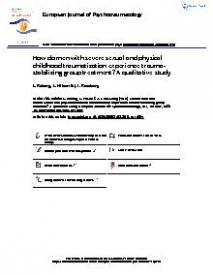How do men with severe sexual and physical childhood traumatization experience traumastabilizing group treatment? A qualitative study
Background: Exposure to potentially traumatizing events, defined as events involving actual or threatened death or serious injury, is associated with an elevated risk of developing enduring physical, psychological and social problems. Complex post-traumatic stress disorder (PTSD) is a disorder that can occur after prolonged and repeated trauma. At least 30% of the sexually abused population is male, but in spite of this fact, treatment research focusing on male victims is virtually non-existent in comparison to research on female victims.
Objective: Trauma-stabilizing group treatment is an increasingly used treatment method for patients with complex PTSD. The aim of the present study was to explore how men participating in a gender-specific trauma-stabilizing intervention experience this treatment approach. Methods: Five men who participated in a trauma-stabilizing group treatment were interviewed with a semi-structured qualitative interview. The data were analysed using interpretative phenomenological analysis.
Results: The analysis revealed five main themes. The themes highlight the experiences of the participants and describe positive and negative experiences: (1) Group atmosphere, comprising safety, community, emotional openness, anxiety and pressure; (2) Learning, categorized into knowledge and self-understanding; (3) Motivation, which describes both inner and outer motivation; (4) Structure, comprising structure of the meetings, group size and duration of the meetings; and (5) Gender, defined as the experiences of being in an allmale group with female group leaders.
Conclusions: There seem to be a lot of advantages to inviting men to attend gender-specific groups for trauma-stabilizing treatment. The men emphasized the support they received and that participating in a mixed-gender group would have been more difficult. In the future, it may be important to arrange all-male stabilization groups with more focus on male-specific topics.
HIGHLIGHTS
• There are a lot of advantages to inviting men to attend gender-specific groups for traumastabilizing treatment.
• Participating in a mixedgender group would have been difficult.
• In the future, it is important to arrange allmale stabilization groups with more focus on malespecific topics.
• The men emphasized the support they received in the group.
Geachte bezoeker,
De informatie die u nu opvraagt, kan door psychotraumanet niet aan u worden getoond. Dit kan verschillende redenen hebben,
waarvan (bescherming van het) auteursrecht de meeste voorkomende is. Wanneer het mogelijk is om u door te verwijzen naar de bron
van deze informatie, dan ziet u hier onder een link naar die plek.
Als er geen link staat, kunt u contact opnemen met de bibliotheek,
die u verder op weg kan helpen.
Met vriendelijke groet,
Het psychotraumanet-team.
In: European Journal of Psychotraumatology, ISSN 2000-8066 | 9 | 1541697
https://www.tandfonline.com/doi/pdf/10.1080/20008198.2018.1541697


